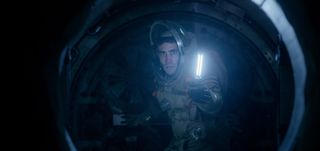Alien in 'Life' Raises Some Philosophical Questions for Humanity, Director Says

The new science-fiction-horror movie "Life" centers on a bloodthirsty alien life-form, but the film's director, Daniel Espinosa, told Space.com that viewers shouldn't be too quick to cast the alien as a villain.
The film begins when a dormant, single-celled life-form is discovered on Mars and is brought to the International Space Station to be studied. A group of astronauts manages to revive the creature — nicknamed "Calvin" — only to see it grow rapidly in size, intelligence and strength. Soon, Calvin escapes its captors and realizes it can gain sustenance from their bodies.
Is Calvin's behavior vindictive, or is it a natural response to being a test subject? Does the creature behave any differently from the way humans have behaved and treated one another throughout our shared history? Espinosa thinks Calvin's behavior should prompt humans to do some self-reflection. [Best Space Movies in the Universe]
"For me, Calvin is not malicious," Espinosa told Space.com. "He is only reacting."
What would happen if humanity were to encounter an alien species? That's a question that science-fiction movies have explored for about as long as science-fiction movies have been around. These flicks often explore how humanity might cope with an aggressive alien species, or how humans might end up being the aggressors. Espinosa said Calvin's behavior in "Life" is perhaps no different from that of any other animal in a similar situation. Perhaps the problem is not with Calvin, but with how his captors treat him.
"I think we have to think about … how we as a human species have reacted when we encounter the unknown," Espinosa said. "I mean, if you look into the history of the human species and how we have encountered new territories and new peoples, we have not been open-minded and gentle."
"I truly believe that space could make us better. It could unite us," Espinosa continued. "But we have to get to a place where we are willing to [do] a bit of self-reflection [about] mankind's history."
Get the Space.com Newsletter
Breaking space news, the latest updates on rocket launches, skywatching events and more!
Actor Ariyon Bakare plays scientist Hugh Derry, who awakens Calvin and watches him grow. Despite Calvin's horrible behavior, Derry can't help but love this creature. [The Scariest Space Movies in the Universe]
"I thought it would be like when you go in for that first [pregnancy] scan and you see your baby: It was like I was a father to this great discovery," Bakare told Space.com. "And yet, like a child in the teenage years, [the life-form] can become exceptionally unruly. But you still love them. Then, it became a dilemma between my rational mind and my irrational mind — yes, I know we've got to destroy this thing, but this is also the greatest discovery ever! And we've got to contain it; we've got to look after it; we've got to teach it."
Bakare brought up an interesting question: If a life-form is hostile toward humanity but only because the life-form is acting on its instincts, can the two species ever respect each other? Or would that scenario erode any possible trust?
Astrophysicists and people who are looking for signs of intelligent civilizations in the universe have also discussed whether an alien species with the technology to visit our planet would be more likely to be peaceful or hostile. Astronomer and science communicator Carl Sagan said he thought such a civilization would be totally peaceful. Astrophysicist Stephen Hawking has said he thinks it's more likely they'll be conquerors — similar to the Europeans who colonized the Americas and nearly wiped out the native populations in the process. If humans discover a kind of life that we can initially dominate, will we treat it with respect or dominance?
"Life" is first and foremost a horror movie (and viewers should be aware that the flick earns its "R" rating from some gory and disturbing scenes), but there's some philosophy to be found in it as well. It's contributing a few words to a discussion that's been going on in science-fiction movies for decades.
"Life" debuts in theaters nationwide on Friday, March 24.
Follow Calla Cofield @callacofield. Follow us @Spacedotcom, Facebook and Google+. Original article on Space.com.
Join our Space Forums to keep talking space on the latest missions, night sky and more! And if you have a news tip, correction or comment, let us know at: community@space.com.

Calla Cofield joined Space.com's crew in October 2014. She enjoys writing about black holes, exploding stars, ripples in space-time, science in comic books, and all the mysteries of the cosmos. Prior to joining Space.com Calla worked as a freelance writer, with her work appearing in APS News, Symmetry magazine, Scientific American, Nature News, Physics World, and others. From 2010 to 2014 she was a producer for The Physics Central Podcast. Previously, Calla worked at the American Museum of Natural History in New York City (hands down the best office building ever) and SLAC National Accelerator Laboratory in California. Calla studied physics at the University of Massachusetts, Amherst and is originally from Sandy, Utah. In 2018, Calla left Space.com to join NASA's Jet Propulsion Laboratory media team where she oversees astronomy, physics, exoplanets and the Cold Atom Lab mission. She has been underground at three of the largest particle accelerators in the world and would really like to know what the heck dark matter is. Contact Calla via: E-Mail – Twitter
